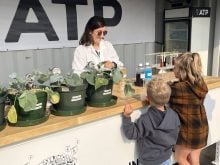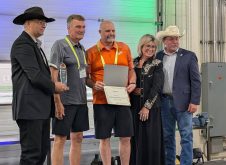Many American states and agricultural universities have ag tech accelerators.
Definitions vary, but an accelerator is an organization that helps start-up companies and entrepreneurs get their technology to market.
It usually features a mentorship program, where experienced business leaders assist a young entrepreneur. Some accelerators provide funding for the start-up.
Related stories in this special report:
- Innovation train stalls on the tracks
- FCC major player in ag venture capital
Read Also

Forecasts point toward snowy winter
Even though it’s expected to be weak, La Niña often brings colder-than-average winters across the Prairies, with wetter conditions in the west and drier weather in the east.
Steve Webb, who spent more than two decades working at Dow AgroSciences and Corteva, is skeptical about accelerators, particularly when it comes to agriculture.
“I don’t think accelerators work for ag. Full stop,” said Webb, who is the chief executive officer with the Global Institute for Food Security (GIFS) in Saskatoon.
“Most of the people who use the word ‘accelerator’ don’t know what they do.”
Webb does know something about ag tech innovation.
While working at Dow’s headquarters in Indianapolis, he was responsible for external technology, intellectual property development and early stage commercial assessment.
Accelerators may work for digital technology, but ag is different, Webb said.
Innovators with an agricultural technology need much more than mentorship. They need money and time to prove that their technology works.
“Ag tech. You’re looking at two years of field studies…. You’re looking at having to access some really expensive infrastructure and equipment,” Webb said. “(Investors) want to see real performance in the crop of interest, on the pest of interest.”
GIFS is looking to play a key role in the “path to commercialization” of ag technology.
In January, GIFS and the University of Saskatchewan launched the Omics and Precision Agriculture Laboratory (OPAL), a state-of-the-art facility with a goal of speeding up ag and agri-food innovation.
“It is the only (place) in the country to provide analytical and computational services including genomics (the study of genetic materials), phenomics (the study of an organism’s traits) and bioinformatics (analyses of biological data),” GIFS said in a release.
GIFS and AgWest Bio, which has a mandate of moving research to market, are also working on concept called the Agri-Food Advancement Centre.
“It’s different from a (tech) incubator and an accelerator…. The duration (that) companies are in there is much longer,” Webb said. “(Accelerators) are largely focused on the investment networking…. With ag tech, it needs to be focused on de-risking the technology.”
Webb has spoken with other organizations about the Advancement Centre concept. So far, the response has been favourable.
















